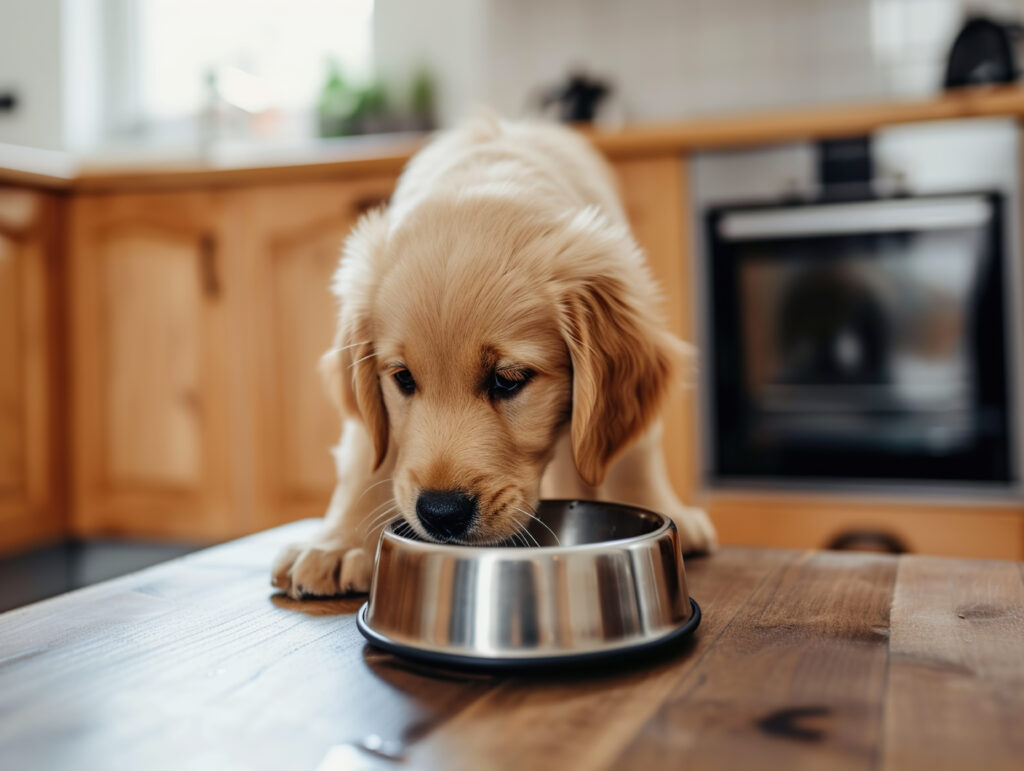Feeding a Golden Retriever puppy right isn’t rocket science, but there’s more to it than dumping kibble in a bowl twice a day. These dogs grow fast and eat constantly, which means every meal matters more than you might think.
The thing about Golden Retriever puppies is they don’t know when to stop eating. Ever. They’ll polish off their food, then stare at you like they haven’t eaten in weeks. Learning to ignore those pleading eyes is probably the hardest part of puppy ownership.
What makes feeding tricky is that their needs change every few months. What works at 10 weeks won’t work at 6 months. Get behind the curve and you’re dealing with digestive issues, growth problems, or a chunky puppy that turns into an overweight adult with joint problems.
Growth Phases You Need to Know
Golden Retriever puppies don’t grow steadily. They hit growth spurts where they seem to double in size overnight, then plateau for weeks. During the spurts, they eat everything in sight. During plateaus, they might pick at their food and leave you wondering if something’s wrong.

Golden Retriever Puppy Feeding Tips
The first four months are when they build their basic frame. Everything—bones, organs, immune system—is developing rapidly. Mess up nutrition during this window and you’re setting them up for problems later.
Between four and eight months, they pack on serious size. This is when people often overfeed because the puppy acts constantly hungry. Resist the urge. Overweight puppies during rapid growth phases often develop hip and elbow problems as adults.
After eight months, they’re mostly done growing taller but still filling out with muscle. Their appetite usually decreases during this phase, which catches a lot of owners off guard. This is normal, not a sign they’re sick.
Picking the Right Food
Large Breed Formulas Matter
Regular puppy food is wrong for Golden Retrievers. Large breed puppy formulas have different calcium and phosphorus levels that prevent skeletal disorders. Using regular puppy food can cause bones to grow too fast, creating structural problems.
Look for foods where real meat is the first ingredient. Chicken, beef, lamb, fish—doesn’t matter which, just make sure it’s specific. Avoid foods that start with “meat meal” or “poultry by-product meal” as the main ingredient.
The protein level should be 22-26%. More isn’t better—it’s just more expensive. Fat should be around 12-15%. Too much fat creates overweight puppies. Too little fat doesn’t provide enough energy for proper development.
Skip the grain-free trend unless your puppy has proven allergies. Recent studies suggest grain-free diets might contribute to heart problems in Golden Retrievers. Rice, oats, and barley are fine ingredients that provide energy and fiber.
Feeding Schedule Reality
Puppies under 16 weeks need four meals daily. Their stomachs are small and they can’t go long periods without eating. Skipping meals or feeding too much at once causes blood sugar swings and digestive upset.
From 16 weeks to six months, switch to three meals. Morning, afternoon, and evening works for most families. This gives you better portion control while keeping their energy stable.
After six months, twice daily feeding is plenty. Most adult Golden Retrievers eat morning and evening meals for their entire lives. Establishing this routine early makes training easier and prevents begging throughout the day.
Measure everything. The feeding charts on dog food bags are suggestions, not commandments. Your puppy might need more or less depending on activity level and metabolism. Adjust based on how they look and feel, not how much they beg.
Nutrition by Life Stage
8-20 Weeks: Building Blocks
This is when puppies need the highest quality nutrition they’ll ever get. Their brains, bones, and organs are developing rapidly. Cheap food during this phase can cause lasting problems.
Feed small portions frequently. A young puppy can’t eat large meals without getting sick, but they need consistent nutrition throughout the day. Think of it like feeding a human baby—little and often.
Weight gain should be steady but not excessive. Healthy Golden Retriever puppies gain 1-2 pounds weekly during this phase. Much more than that suggests overfeeding. Much less might indicate health problems or inadequate nutrition.
5-8 Months: Power Growth
This is when Golden Retrievers really explode in size. They might seem to outgrow everything overnight—collars, beds, the space under your coffee table. Their appetite becomes enormous, but don’t give in to every demand.
Stick with large breed puppy food and watch their body condition carefully. You should feel their ribs easily without pressing hard. If they’re getting pudgy, cut back on portions regardless of how pitiful they look.
Some puppies go through phases where they’re less interested in food during this period. Don’t panic and start adding treats or changing foods. Stick with your routine unless there are other signs of illness.
8+ Months: Filling Out
Growth slows significantly after eight months, but muscle development continues for another year or more. Appetite often decreases during this phase as rapid growth phases end.
Continue with puppy food until at least 12 months, possibly longer for larger males. The transition to adult food should be gradual, mixing increasing amounts of adult food with decreasing amounts of puppy food over about a week.
Watch for weight gain during this phase. Less active growth means they need fewer calories, but their appetite might not adjust immediately. Adjust portions based on body condition, not age.
